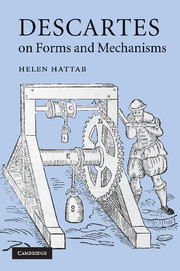PART II - CHALLENGING THE SUBSTANTIAL FORM
Published online by Cambridge University Press: 15 September 2009
Summary
In Part I, I showed that Suarez's efforts to save the substantial form emphasized its role as a physical principle justified primarily on empirical rather than metaphysical or purely logical grounds. By relating both his account and that of Aquinas to the a priori argument Descartes offers to Regius, I argued that something akin to Suarez's conception of the substantial form as a self-subsistent, partial substance, rather than the Thomist view, is probably the target of Descartes' charge that material substantial forms are inconsistent with the Scholastic definition of a substantial form. Hence Suarez's definition of the substantial form makes it easy for Descartes to reduce this particular Scholastic doctrine to absurdity. Such late Scholastic metaphysical innovations thus constitute a vital sine qua non in the shift from hylomorphism to mechanism. However, while they serve to clarify the nature of Descartes' negative metaphysical arguments against material substantial forms, they are insufficient to account for the positive view he developed to replace them. I now turn to the remaining scientific arguments against substantial forms that Descartes recommends to Regius, namely, the nature/machine analogy and his appeal to the success of mechanistic explanations.
In this part of the book, I will argue that Descartes bases his initial replacement of material substantial forms with mechanisms on objections to the form of scientific explanation employed in Aristotelian physics rather than on metaphysical concerns.
- Type
- Chapter
- Information
- Descartes on Forms and Mechanisms , pp. 65 - 68Publisher: Cambridge University PressPrint publication year: 2009



